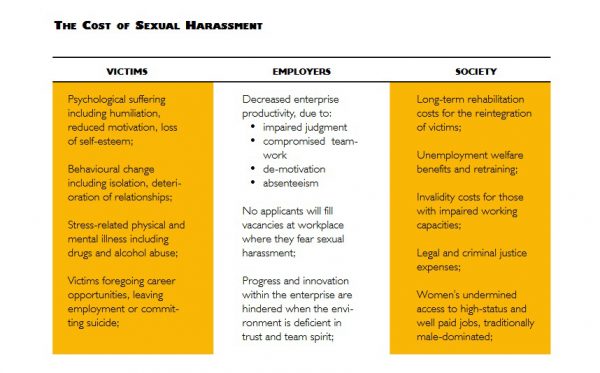There is no doubt that sexual harassment is prevalent in workplaces but because it is not taken seriously by many organisations, the victims are often re-victimised and they suffer in silence. Women’s rights activist Danuta Radzik believes that to really address the problems, all workplaces, whether public or private, should implement policies that clearly set out the steps to be taken when this occurs.
“All public and private sectors organisations, inclusive of the ministries, businesses, including the whole range of them like mining and forestry, they should all have sexual harassment policies in the workplace,” Radzik told Stabroek Weekend in a recent interview.
She believes such a move will not be difficult as there are many resources online which can be used but first and foremost the policy must clearly define sexual harassment and then outline the steps to be taken by employees as it relates to lodging a complaint of sexual harassment.

Under the 1997 Prevention of Discrimination Act, sexual harassment is defined as unwanted conduct of a sexual nature in the workplace or in connection with the performance or work which is threatened or imposed as a condition of employment on an employee or which creates a hostile working environment for the employee.
“Any act of sexual harassment against an employee committed by an employer, managerial employee or coworker shall constitute unlawful discrimination based on sex within the meaning of section 4 of this Act,” it states.
According to an International Labour Organization (ILO) Fact Sheet on sexual harassment, it may take two forms: 1) Quid Pro Quo, when a job benefit – such as a pay rise, a promotion, or even continued employment – is made conditional on the victim acceding to demands to engage in some form of sexual behaviour; or, 2) a hostile working environment, in which the conduct creates conditions that are intimidating or humiliating for the victim.
It further notes that behaviour that qualifies as sexual harassment can be physical, such as physical violence, touching, unnecessary close proximity; verbal, such as comments and questions about appearance, lifestyle, and sexual orientation; and non-verbal, such as whistling, sexually-suggestive gestures, and the display of sexual materials.
Karen de Souza, head of Red Thread, which works for the protection of women, believes that sexual harassment continues to be one of the more difficult sexual offences to confront, partly because so few cases are reported anywhere.
“It is doubly vicious because it threatens the livelihood of the victim, and the perpetrator can justify his behaviour in cases where the victim gives in as ‘willing,’” she said.
de Souza referred to a recent reported case of sexual harassment at the Cheddi Jagan International Airport (CJIA), which saw the accuser being forced to bring the police into the matter one year after she had brought the incident to the attention of the CJIA’s management.
Those authorities were said to have investigated the matter, but no sanction was taken against the alleged perpetrator. After her report to the police, the accused was sent on leave, but the complainant’s security pass was withdrawn, effectively denying her the right to work at the airport for her company.
The accused has since returned to work even as the police investigation is said to be ongoing and while the airport has announced that it is taking steps to address the issue of sexual harassment, the woman’s security pass was not returned.
“If the police are really serious about addressing sexual harassment, then they should charge the airport authorities who investigated the report, and those who took her security clearance away with obstruction and conspiracy to cover up a crime,” de Souza said.
After the woman’s pass was withdrawn it was felt that she was being penalised for

making the report and when this was put to Alex Graham, who makes public statements on behalf of the airport, he stated, “The decision was taken to have both persons away from the airport to allow the investigation to proceed unencumbered, especially since these persons work in a high security environment.”
de Souza called upon the airport to publish its sexual harassment policy and provide the records of its investigation to the police.
While the airport said its board is taking steps to tackle the issue, it narrowed this down to reviewing “all policies, protocols, regulations, and practices that govern conduct and engagements in the workplace” and said that it had taken steps to hire external consultants and specialists to conduct the reviews.
“I have little confidence in the police taking this forward since the last police investigation into a similar matter that we were aware of went nowhere after concerted efforts to frustrate the victim,” de Souza disclosed.
She suggested that the Director of Public Prosecutions (DPP) should offer the public advice about the elements which must be proven to prosecute this crime, and the Department of Labour must issue stringent guidelines and protocols to protect employees from sexual harassment.
“I think a real problem for victims is the almost inevitable question, ‘is it true,’ followed, of course, with how good and nice and considerate the man is. Victims need support and they need to be prepared for the nastiness of the workplace and the possibility of joblessness once they decide to report and confront,” the human rights activist stressed.
Most difficult
Stabroek Weekend reached out to Chief Labour Officer Charles Ogle on the issue but was unable to get a comment. However, a knowledgeable source in the Labour Department explained that sexual harassment and racial discrimination are two of the most difficult acts to prove. According to the source, there is nothing specific in the labour laws that address sexual harassment although Guyana has ratified an ILO Convention that deals with it.
The source said while there have been complaints to the department, it has been unable to offer any real redress to the complainants. It was stressed that sexual harassment is more of a criminal nature and must be dealt with by the police.
“You have to remember that the perpetrators most times are knowledgeable, and they would choose when to make their move and most times it is the complainant’s word against the perpetrator’s, who most times has some clout or power,” the source noted.
The source shared that there was an instance where a case of sexual harassment was proven against a senior manager in a government organisation but instead of punishing the perpetrator the powers that be fired the complainant and kept the man on the job. “These are the issues we have to deal with,” the source stated.
Radzik said while action under the 1997 Act can be an option, it will be a civil matter and most times the victim does not have the money to take such route and while there is Legal Aid some are just not prepared for that course.
Chief Labour Officer Mohammed Akeel, in a labour profile on Guyana he prepared for the ILO in 2001, had said the “Ministry of Labour enforces the law on discrimination and sexual harassment”. However, the reality is that the ministry is ill equipped to deal with the issue.
The call by Radzik was sounded in the past by the Women and Gender Equality Commission and was one of its recommendations in 2017.
Chairperson of the Commission Indra Chandarpal said earlier this year that it was an initiative the commission started a while ago and while it recognised that there is a Prevention of Discrimination Act of 1997, “We feel that we need to have a separate special law on sexual harassment, not only law but a policy and to educate employers and the public as a whole.”
At the time, she had shared that the commission had been going into schools and police stations and distributing sexual harassment posters as part of its public education campaign. “It is a tough situation out there, especially when there are not adequate jobs… when people are faced with sexual harassment, they want to keep it under the rug and they don’t want to come forward,” the commission’s Chair had said at the time.
And sadly, even though the commission had boxes placed around at post offices, hospitals and the National Library for persons who faced harassment to disclose by anonymously slipping notes into the boxes, the response had not been good.
“…You see, people are still afraid because they are afraid to even write a letter to say I am sexually harassed. They are also afraid that whoever will receive that letter will not be confidential,” Chandarpal had pointed out.
It has been more than two years since the boxes were placed and only one complaint was placed inside from the University of Guyana and while the things students wrote and put in there “were amazing,” no one wanted to pursue any action.
Poisonous
Further outlining how workplaces can really address the issue, Radzik said they can set up committees to which complaints can be made and those committees should have representatives who are of good standing and people who have the confidence of persons and who are not seen as potential sexual harassers.
A tribunal can also be set up outside of the workplace where matters can be sent.
“The fact that you have a policy, you don’t just write and say you have one. They have to do education among the entire work force, [outlining] what is unacceptable behaviour and that the company has agreed to take steps once a complaint is made,” she said, while adding that the penalties that will be taken should also be listed and these can range from a warning, or counselling to actual dismals.
“It should be a comprehensive policy and having one is absolutely key,” she said.
Asked about the acts being reported to the police, Radzik said when this is done the police have to investigate then charge. However, she pointed out that the Sexual Offences Act does not cover sexual harassment, as it relates to unwanted comments, but if it involves touching then this can be viewed as sexual assault, which is covered under the Act.
“A lot of the sexual harassment starts with inappropriate language and that can escalate if the perpetrator sees [himself or herself] getting away with it and then they can go further,” she pointed out.
Distressingly, Radzik said, it can take up to three years for the matters to reach the court, and sometimes the victims may not want to go that far. “It is awful that women are told of their bodies and it affects their work and the entire workplace becomes poisonous,” she said.
Sexual harassment continues to be a big problem and Radzik pointed out that people in the organisations will be against the victim and this also happens in the police force and other security forces. “At a certain level, guys do not understand that it is not fun, and sometimes it is a lack of knowledge and therefore education is key,” she said of those who perpetrate the act.





